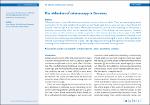The utilization of colonoscopy in Germany
Starker, Anne
Buttmann-Schweiger, Nina
Kraywinkel, Klaus
Kuhnert, Ronny
Colorectal cancer is one of the three most common cancers in German adults. There are several legally based examinations for the early detection of colorectal cancer. People aged 50 to 54 years can have a faecal blood test annually. From the age of 55, this test is offered every two years as part of cancer screening, or alternatively a preventive colonoscopy, which can be repeated after ten years if the findings are inconspicuous. However, colonoscopies are also carried out to clarify complaints or other diseases (curative colonoscopy). In the GEDA 2014/2015-EHIS study, the respondents provided the date of their last colonoscopy. No data was collected on the reason why this colonoscopy was performed. 57% of women and 61% of men aged 55 years or older reported that they had a colonoscopy within the last 10 years. New legal regulations envisage the expansion of colorectal cancer screening and its development into an organised, quality-assured early detection programme.
No license information

